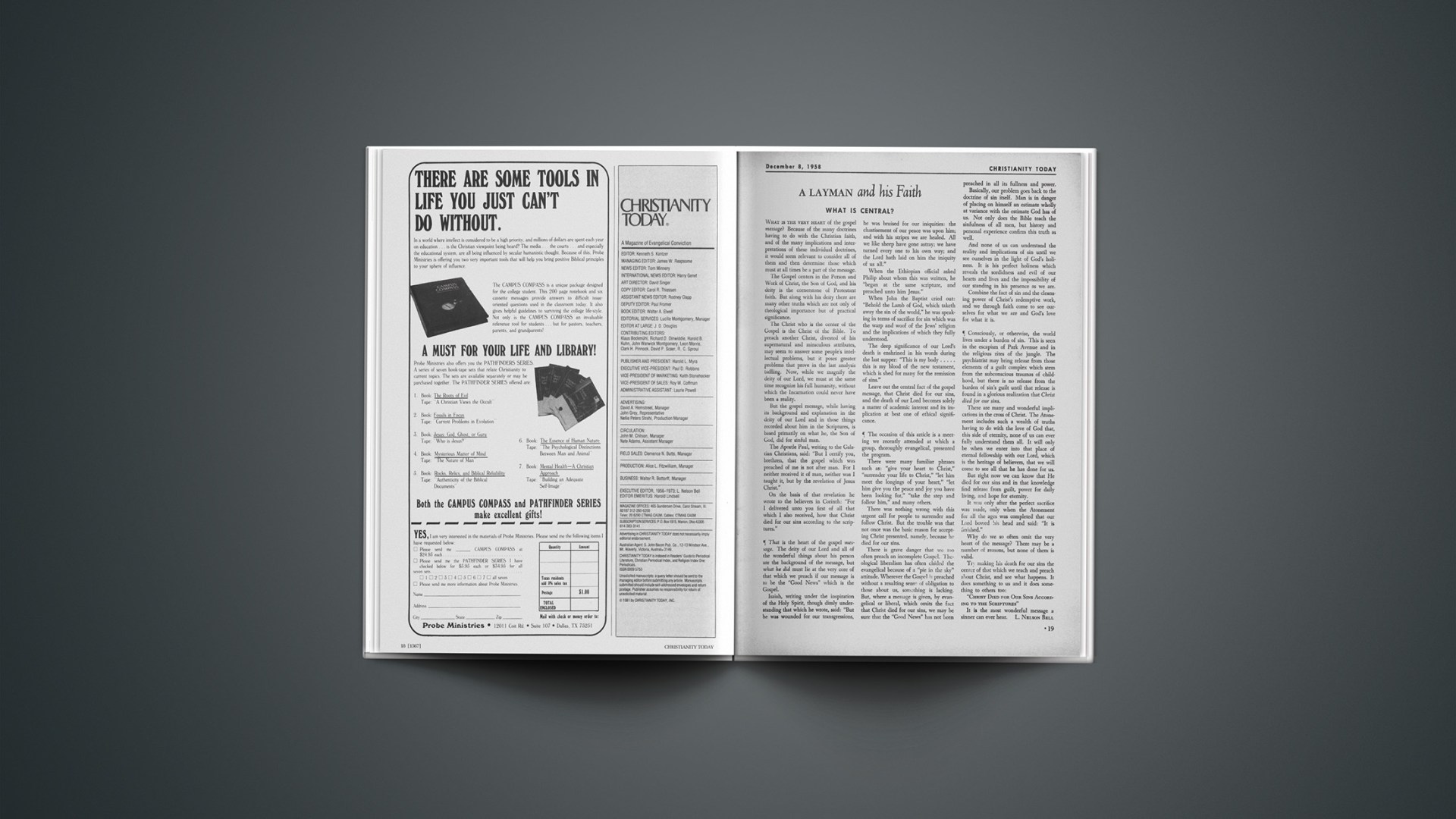What is the very heart of the gospel message? Because of the many doctrines having to do with the Christian faith, and of the many implications and interpretations of these individual doctrines, it would seem relevant to consider all of them and then determine those which must at all times be a part of the message.
The Gospel centers in the Person and Work of Christ, the Son of God, and his deity is the cornerstone of Protestant faith. But along with his deity there are many other truths which are not only of theological importance but of practical significance.
The Christ who is the center of the Gospel is the Christ of the Bible. To preach another Christ, divested of his supernatural and miraculous attributes, may seem to answer some people’s intellectual problems, but it poses greater problems that prove in the last analysis baffling. Now, while we magnify the deity of our Lord, we must at the same time recognize his full humanity, without which the Incarnation could never have been a reality.
But the gospel message, while having its background and explanation in the deity of our Lord and in those things recorded about him in the Scriptures, is based primarily on what he, the Son of God, did for sinful man.
The Apostle Paul, writing to the Galatian Christians, said: “But I certify you, brethren, that the gospel which was preached of me is not after man. For I neither received it of man, neither was I taught it, but by the revelation of Jesus Christ.”
On the basis of that revelation he wrote to the believers in Corinth: “For I delivered unto you first of all that which I also received, how that Christ died for our sins according to the scriptures.”
That is the heart of the gospel message. The deity of our Lord and all of the wonderful things about his person are the background of the message, but what he did must lie at the very core of that which we preach if our message is to be the “Good News” which is the Gospel.
Isaiah, writing under the inspiration of the Holy Spirit, though dimly understanding that which he wrote, said: “But he was wounded for our transgressions, he was bruised for our iniquities: the chastisement of our peace was upon him; and with his stripes we are healed. All we like sheep have gone astray; we have turned every one to his own way; and the Lord hath laid on him the iniquity of us all.”
When the Ethiopian official asked Philip about whom this was written, he “began at the same scripture, and preached unto him Jesus.”
When John the Baptist cried out: “Behold the Lamb of God, which taketh away the sin of the world,” he was speaking in terms of sacrifice for sin which was the warp and woof of the Jews’ religion and the implications of which they fully understood.
The deep significance of our Lord’s death is enshrined in his words during the last supper: “This is my body … this is my blood of the new testament, which is shed for many for the remission of sins.”
Leave out the central fact of the gospel message, that Christ died for our sins, and the death of our Lord becomes solely a matter of academic interest and its implication at best one of ethical significance.
The occasion of this article is a meeting we recently attended at which a group, thoroughly evangelical, presented the program.
There were many familiar phrases such as: “give your heart to Christ,” “surrender your life to Christ,” “let him meet the longings of your heart,” “let him give you the peace and joy you have been looking for,” “take the step and follow him,” and many others.
There was nothing wrong with this urgent call for people to surrender and follow Christ. But the trouble was that not once was the basic reason for accepting Christ presented, namely, because he died for our sins.
There is grave danger that we too often preach an incomplete Gospel. Theological liberalism has often chided the evangelical because of a “pie in the sky” attitude. Wherever the Gospel is preached without a resulting sense of obligation to those about us, something is lacking. But, where a message is given, by evangelical or liberal, which omits the fact that Christ died for our sins, we may be sure that the “Good News” has not been preached in all its fullness and power.
Basically, our problem goes back to the doctrine of sin itself. Man is in danger of placing on himself an estimate wholly at variance with the estimate God has of us. Not only does the Bible teach the sinfulness of all men, but history and personal experience confirm this truth as well.
And none of us can understand the reality and implications of sin until we see ourselves in the light of God’s holiness. It is his perfect holiness which reveals the sordidness and evil of our hearts and lives and the impossibility of our standing in his presence as we are.
Combine the fact of sin and the cleansing power of Christ’s redemptive work, and we through faith come to see ourselves for what we are and God’s love for what it is.
Consciously, or otherwise, the world lives under a burden of sin. This is seen in the escapism of Park Avenue and in the religious rites of the jungle. The psychiatrist may bring release from those elements of a guilt complex which stem from the subconscious traumas of childhood, but there is no release from the burden of sin’s guilt until that release is found in a glorious realization that Christ died for our sins.
There are many and wonderful implications in the cross of Christ. The Atonement includes such a wealth of truths having to do with the love of God that, this side of eternity, none of us can ever fully understand them all. It will only be when we enter into that place of eternal fellowship with our Lord, which is the heritage of believers, that we will come to see all that he has done for us.
But right now we can know that He died for our sins and in that knowledge find release from guilt, power for daily living, and hope for eternity.
It was only after the perfect sacrifice was made, only when the Atonement for all the ages was completed that our Lord bowed his head and said: “It is finished.”
Why do we so often omit the very heart of the message? There may be a number of reasons, but none of them is valid.
Try making his death for our sins the center of that which we teach and preach about Christ, and see what happens. It does something to us and it does something to others too:
“CHRIST DIED FOR OUR SINS ACCORDING TO THE SCRIPTURES”
It is the most wonderful message a sinner can ever hear.










